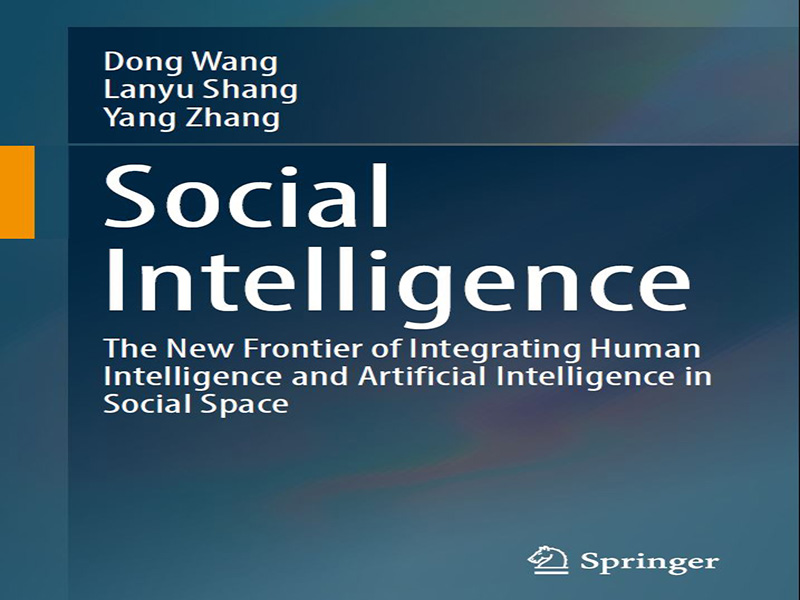- عنوان کتاب: Social Intelligence -The New Frontier of Integrating Human Intelligence and Artificial Intelligence in Social Space
- نویسنده: Dong Wang , Lanyu Shang , Yang Zhang
- حوزه: هوش اجتماعی
- سال انتشار: 2025
- تعداد صفحه: 307
- زبان اصلی: انگلیسی
- نوع فایل: pdf
- حجم فایل: 6.05 مگابایت
ظهور هوش مصنوعی (AI) و تعاملات تنگاتنگ آن با انسانها و جامعه ما منجر به ظهور حوزه جدیدی به نام هوش اجتماعی (SI) میشود. هوش اجتماعی با نقاط قوت مکمل هوش مصنوعی و انسانها انگیزه میگیرد. به عنوان مثال، مشاهده میشود که هوش مصنوعی در کارهایی که نیاز به سرعت بالا، اجرا در مقیاس بزرگ و تولید نتایج کمی دقیق دارند، برتری دارد. در مقابل، انسانها اغلب در کارهایی که نیاز به تفکر انتقادی، کارهای خلاقانه و مهارتهای اجتماعی عالی دارند، از ماشینها بهتر عمل میکنند. برخلاف بسیاری از آثار موجود که هوش مصنوعی و انسانها را به عنوان رقیب در یک بازی با حاصل جمع صفر در نظر میگیرند، این کتاب چشمانداز هیجانانگیزی از هوش اجتماعی ارائه میدهد که به انسانها و هوش مصنوعی اجازه میدهد تا با یکدیگر همکاری کنند و با بررسی کامل نقاط قوت و تعاملات مکمل خود در فضای اجتماعی، یک الگوی جدید از هوش جمعی و ترکیبی بسازند. هوش مصنوعی با آزادسازی کامل قدرت ادغام هوش انسانی با هوش مصنوعی، راهحلهای هوش مصنوعی انسانمحور را در بسیاری از حوزههای کاربردی حیاتی توانمند خواهد کرد. نمونههایی از چنین حوزههای کاربردی شامل کشف و توضیح حقیقت، تجزیه و تحلیل مراقبتهای بهداشتی، واکنش به بلایا، آموزش آنلاین، تشخیص چهره، حمل و نقل هوشمند، سنجش شهری و شهرهای هوشمند است. الگوی هوش اجتماعی مجموعهای از چالشهای حیاتی را برای تحقیق معرفی میکند. مثالهایی از این موارد عبارتند از ناهمگنی و پراکندگی دادههای انسانمحور، عمومیت و سازگاری مدل، قابلیت توضیح، انصاف و سوگیری، حریم خصوصی و ادغام هوش ترکیبی. این کتاب با ارائه مجموعهای از چارچوبهای تحلیلی اصولی و طراحیهای سیستم دنیای واقعی که به طور کامل نقاط قوت جمعی هوش مصنوعی و هوش انسانی را بررسی میکنند، ضمن پرداختن صریح به نگرانیها و محدودیتهای منحصر به فرد انسانها، به این چالشها میپردازد. این کتاب ابتدا مجموعهای از راهحلهای جدید هوش مصنوعی انسانمحور (به عنوان مثال، رویکردهای چندوجهی، مدلهای قوی و قابل تعمیم، طرحهای هوش مصنوعی قابل توضیح با توانمندسازی اجتماعی) را برای پرداختن به چالشهای هوش مصنوعی فوقالذکر ارائه میدهد. سپس این کتاب چندین چارچوب یادگیری مشارکتی انسان-هوش مصنوعی را ارائه میدهد که به طور مشترک نقاط قوت هوش انسانی جمعی از مردم و هوش مصنوعی را برای پرداختن به محدودیتهای راهحلهای صرفاً انسانی یا صرفاً هوش مصنوعی ادغام میکنند. در نهایت، کتاب به مسائل مبرم اجتماعی و انسانمحور در هوش مصنوعی مانند انصاف، سوگیری و حریم خصوصی میپردازد. این کتاب همچنین ارزیابی گستردهای از سیستمهای هوش اجتماعی مورد بحث در کاربردهای دنیای واقعی و مطالعات موردی ارائه میدهد تا اثربخشی و بهبود عملکرد راهحلهای ارائه شده را در مقایسه با مبانی پیشرفته در جنبههای مختلف مانند دقت مدل، تعمیمپذیری، قابلیت توضیح، عدالت الگوریتمی و استحکام سیستم نشان دهد. با بهرهگیری از مدلها، تکنیکها و سیستمهای ارائه شده در این کتاب، خواننده با مبانی تحلیلی، چارچوبهای بهینه و نمونههای اولیه سیستم مورد نیاز برای بررسی قدرت هوش اجتماعی آشنا میشود. الگوی هوش اجتماعی، روندهای فعلی تعاملات انسان و هوش مصنوعی، هوش مصنوعی با کمک انسان و هوش مصنوعی برای خیر اجتماعی را به یک اکوسیستم جامع انسان و هوش مصنوعی با زمینه اجتماعی تعمیم میدهد. این کتاب خواننده را از طریق زیربنای تحلیلی و سیستماتیک توسعه نظریهها، مدلها و سیستمهای جدید در حوزه هوش اجتماعی، به سفری اکتشافی میبرد. منحصر به فرد بودن ماهیت انسان محور و ادغام هوش انسانی و هوش مصنوعی، این سفر را هیجانانگیزتر و چالش برانگیزتر میکند. نویسندگان امیدوارند که تکنیکهای توسعه یافته در این کتاب، بخشی از فضای راهحل در مقابله با چالشها در سیستمهای هوش اجتماعی آینده شوند. این تکنیکها میتوانند به آزادسازی کامل قدرت هوش مصنوعی و انسان در نسل بعدی سیستمهای محاسباتی، هوش و اطلاعات کمک کنند.
The rise of Artificial Intelligence (AI) and its tight interactions with humans and our society leads to the emergence of a new field called Social Intelligence (SI). The SI is motivated by the complementary strengths of AI and humans. For example, AI is observed to excel at tasks that require high speed, run at a large scale, and generate accurate quantitative results. In contrast, humans often outperform machines at tasks that require critical thinking, creative works, and excellent social skills. Different from many existing works that take AI and humans as competitors in a zero-sum game, this book presents an exciting vision of SI that allows humans and AI to collaborate with each other and build a novel paradigm of collective and hybrid intelligence by fully exploring their complementary strengths and interactions in the social space. The SI will empower human-centered AI solutions in many critical application domains by fully unleashing the power of integrating human intelligence with AI. Examples of such application domains include truth discovery and explanation, healthcare analytics, disaster response, online education, face recognition, intelligent transportation, urban sensing, and smart cities. The SI paradigm introduces a set of critical challenges for research. Examples include human-centered data heterogeneity and sparsity, model generality and adaptability, explainability, fairness and bias, privacy, and hybrid intelligence integration. This book addresses these challenges by presenting a series of principled analytical frameworks and real-world system designs that fully explore the collective strengths of AI and human intelligence, while explicitly addressing the unique concerns and constraints of humans. The book first presents a set of novel human-centered AI solutions (e.g., multimodal approaches, robust and generalizable models, socially empowered explainable AI designs) to address the aforementioned SI challenges. The book then presents several human-AI collaborative learning frameworks that jointly integrate the strengths of collective human intelligence from people and AI to address the limitations of human-only or AI-only solutions. Finally, the book discusses the pressing societal and human-centered issues in SI such as fairness, bias, and privacy. The book also offers extensive evaluation of the discussed SI systems in real-world applications and case studies to demonstrate the effectiveness and performance gains of the presented solutions in comparison to state-of-the-art baselines in different aspects such as model accuracy, generalizability, explainability, algorithmic fairness, and system robustness. Leveraging the models, techniques, and systems presented in this book, the reader is offered with analytical foundations, optimized frameworks, and system prototypes needed to explore the power of social intelligence. The SI paradigm generalizes the current trends of human-AI interactions, human-assisted AI, and AI for social good into a holistic human-AI ecosystem with social context. The book takes the reader on a journey of discovery through the analytical and systematic underpinning of developing novel theories, models, and systems in the domain of social intelligence. The uniqueness of human-centered nature and integration of human intelligence and AI makes this journey more exciting and challenging. The authors hope that techniques developed in this book will become part of the solution space in dealing with challenges in future social intelligence systems. These techniques can help fully unleash the power of both AI and humans in the next generation of computing, intelligence, and information systems.
این کتاب را میتوانید از لینک زیر بصورت رایگان دانلود کنید:
Download: Social Intelligence




































نظرات کاربران